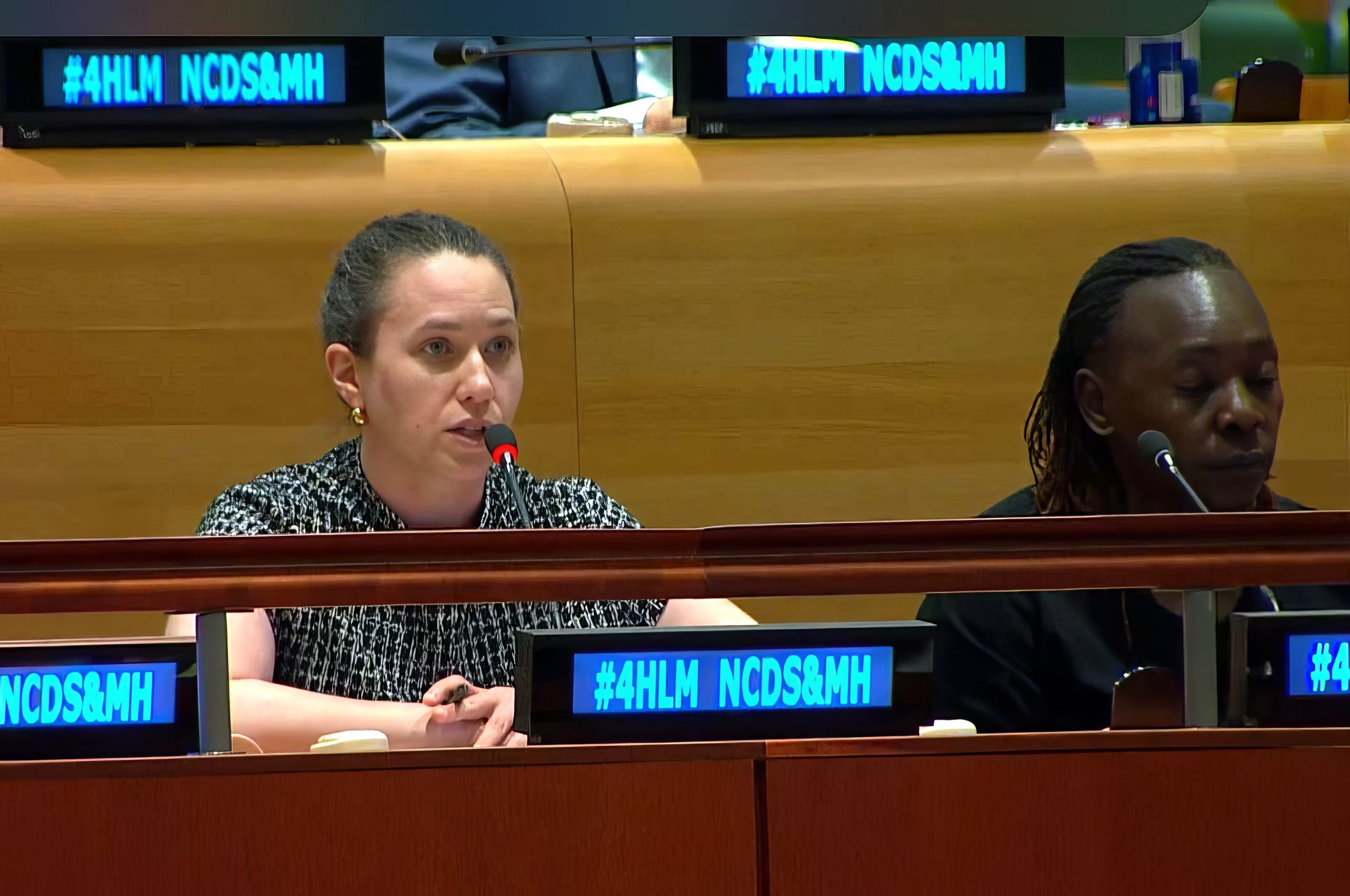At a United Nations Hearing, Network Provides Testimony on Global Health Gaps
During the United Nations’ recent multistakeholder hearing on noncommunicable diseases, Rachel Gasana (left), senior director of advancement for the NCDI Poverty Network, advocated for expanding the global NCD agenda to include severe conditions and younger populations. Seated beside her is Dr. Mary Amuyunzu-Nyamongo, secretary of the NCD Alliance of Kenya and a member of the NCDI Poverty Network’s Steering Committee. (Photo: Courtesy of the United Nations)
“Each year, severe NCDs and injuries cause more than half a million avoidable deaths among the world’s poorest children, adolescents, and young adults in low-income countries,” Rachel Gasana, senior director of advancement for the NCDI Poverty Network, said in her recent testimony at the United Nations Headquarters in New York City. “Despite the proven success of integrated care delivery models such as PEN-Plus in providing lifesaving treatment even in the most under-resourced settings, these young people remain largely excluded from the global health agenda.”
Gasana delivered that statement on behalf of both the NCDI Poverty Network and its Boston co-secretariat, the Center for Integration Science in Global Health Equity at Brigham and Women’s Hospital, at the Multistakeholder Hearing on the Prevention and Control of Noncommunicable Diseases and the Promotion of Mental Health and Well-Being, held May 2. Her testimony was one of 70 by representatives of organizations selected to deliver brief statements as a prelude to the United Nations High-Level Meeting on NCDs in September.
Gasana offered three key recommendations, as detailed in the Network’s recently published Position Statement:
Include children, adolescents, and adults younger than 30 in the NCD Global Monitoring Framework and associated targets;
Deliver on integrated intervention models for severe NCDs, such as PEN-Plus, in national plans and health services, prioritizing access to the most economically vulnerable populations; and
Create targeted new financing mechanisms through the shared interests of philanthropic, private sector, government, and other partners in an integrated response to severe NCDs.
Gasana closed with, “We thank you for your time and attention in ensuring the needs and voices of vulnerable populations affected by severe, chronic NCDs are elevated as an urgent—and actionable—global priority.”
The testimonies of several other speakers complemented her own, Gasana later reported. On behalf of UNICEF, for example, Dr. Rory Nefdt urged an expansion of the global NCD agenda to include younger people.
“We are gathered at a pivotal moment,” said Dr. Nefdt, a senior health advisor who leads the Child Health Unit at the UNICEF Headquarters in New York City. “The burden of NCDs and mental health conditions is growing—and so is the urgency to act. These are not issues at the margins or of older adults in affluent communities; they’re central to the lives of millions. And let’s be clear. The burden is not equally shared; it falls most heavily on those least equipped to bear it: children, young people, their families, and communities living in poverty.”
In another instance, the delegate from Ethiopia touted the country’s establishment of a National NCDI Commission and implementation of integrated NCD services as significant accomplishments in the NCD arena.
“It was incredibly powerful hearing being in the room with hundreds of members of the NCD community calling for more engagement and support for young people, country-led leadership, and financing for health systems strengthening to address the multifaceted needs of people living with severe, chronic conditions,” said Gasana. “This dialogue showcased the impact of years of work by Network members to expand the NCD agenda beyond prevention and to address critical health systems gaps in low-resource settings.”
With the United Nations General Assembly’s zero draft of the political declaration now released, Gasana added, the Network is actively engaged in supporting member states as they provide feedback and participate in negotiations.
Apoorva Gomber (left), associate director of advocacy for the Network, and Rachel Gasana, senior director of advancement for the Network, attend the Multistakeholder Hearing on the Prevention and Control of Noncommunicable Diseases and the Promotion of Mental Health and Well-Being, held at the United Nations Headquarters on May 2.


